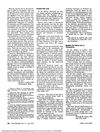
Search
for
Sort by
Research
810-840 / 1000+ results

research Keratins in Health and Cancer: More Than Mere Epithelial Cell Markers
Keratins help protect cells, aid in cancer diagnosis, and influence cancer behavior and treatment.

research Clinical Management of Patients with ASXL1 Mutations and Bohring-Opitz Syndrome, Emphasizing the Need for Wilms Tumor Surveillance
Patients with Bohring-Opitz syndrome and ASXL1 mutations need regular kidney ultrasounds to check for tumors.

research Platelet-Rich Plasma: Principles and Applications in Plastic Surgery
Platelet-rich plasma is beneficial in various plastic surgery applications, but more research is needed to standardize its use.

research Profuse Hair Loss Due to Sudden Weight Loss and Hormonal Injections in Women
Rapid weight loss from dieting and hormonal injections can cause significant hair loss in women.

research Dusko Ilic Explores the Latest Developments in the Field of Stem Cell Research and Regenerative Medicine
Stem cell research and regenerative medicine have made significant advancements in treating various diseases and conditions.

research The Murine Hair Follicle Is a Melatonin Target
Melatonin directly affects mouse hair follicles and may influence hair growth.

research Multiple Flat Warts Due to Tetracycline
Stopping tetracycline can lead to the disappearance of flat warts.

research Platelet-Rich Plasma for Treating Androgenic Alopecia: A Systematic Review
Platelet-Rich Plasma (PRP) treatment may increase hair growth for genetic hair loss, but more research is needed to confirm this.
![Influence of FHIT on Benzo[a]pyrene-Induced Tumors and Alopecia in Mice: Chemoprevention by Budesonide and N-Acetylcysteine](/images/research/f8f56777-f891-4879-8c45-c87d6aa82563/small/35499.jpg)
research Influence of FHIT on Benzo[a]pyrene-Induced Tumors and Alopecia in Mice: Chemoprevention by Budesonide and N-Acetylcysteine
Budesonide and N-acetylcysteine reduced tumors and alopecia in mice, regardless of FHIT gene status.

research The Functional Relevance of the Type 1 Cytokines IFN-γ and IL-2 in Alopecia Areata of C3H/HeJ Mice
IFN-γ and IL-2 are important for T cell activation in hair loss in mice.

research A Variant of the Glucocorticoid Receptor Gene Is Not Associated with Adrenal Androgen Excess in Women with Polycystic Ovary Syndrome
The N363S gene variant does not cause higher adrenal androgen levels in women with polycystic ovary syndrome.

research Adrenal 21-Hydroxylase Gene Mutations in Slovenian Hyperandrogenic Women: Evaluation of Corticotrophin Stimulation and HLA Polymorphisms in Screening for Carrier Status
The study concluded that testing hormone levels after stimulation is not reliable for identifying carriers of 21-hydroxylase deficiency; genetic testing is necessary.

research Increased Frequency of the DI Genotype of the Angiotensin-I Converting Enzyme and Association of the II Genotype with Insulin Resistance in Polycystic Ovary Syndrome
The study suggests certain ACE gene variations are more common in women with PCOS and may be linked to increased insulin resistance.

research A Phytochemical and Pharmacological Review on Cynomorium Songaricum as Functional and Medicinal Food
Cynomorium songaricum has many health benefits and could help with hair regrowth.

research TCM Medicine and Food Homology in the Management of Post-COVID Disorders
Traditional Chinese medicinal foods may help manage long-term post-COVID symptoms.

research Dimorphic Regulation of the MafB Gene by Sex Steroids in Hamsters (Mesocricetus Auratus)
Sex steroids affect the MafB gene differently in male and female hamsters.

research Peroxisome Proliferator Activated Receptors Gamma Serum Levels and Gene Polymorphism in Frontal Fibrosing Alopecia: A Case-Control Study
Lower PPARγ levels and specific gene variations are linked to more severe Frontal Fibrosing Alopecia.

research Claudin-1 and Claudin-3 Maintain Proper Hair Follicle Structure and Regulate Telogen Effluvium
Claudin-1 and Claudin-3 are crucial for keeping hair follicle structure and preventing a type of hair loss called telogen effluvium.

research Orchestrated Cytotoxic and Skin Migratory Ability Lacking Self-Tolerance: Circulating γδT-Cells May Promote Alopecia Areata
The role of γδT-cells in causing alopecia areata remains unclear.

research Both Lesional and Non-Lesional Skin from Acne Patients Shows Robust IL-17-Skewing and Upregulation of Antimicrobial Peptides
Acne patients' skin, both with and without lesions, shows a strong immune response and higher antimicrobial activity.

research Dermatologic Toxicities Associated with Chronic Gamma-Secretase Inhibitor Treatment for Desmoid Tumor
Most patients experienced mild to moderate skin problems during a trial for a desmoid tumor treatment.

research Transplantation Immunology: Solid Organ and Bone Marrow
Transplant success has improved with better immunosuppressive drugs and donor matching.

research Androgens and Female Sexual Function and Dysfunction—Findings From the Fourth International Consultation of Sexual Medicine
Androgens play a role in female sexual function, and testosterone therapy can help women with low sexual desire, but more research is needed on treatments and long-term safety.

research Impact of Different Preparation Methods to Obtain Autologous Non-Activated Platelet-Rich Plasma and Activated Platelet-Rich Plasma in Plastic Surgery: Wound Healing and Hair Regrowth Evaluation
Different methods of preparing Platelet-Rich Plasma (PRP) can affect wound healing and hair regrowth in plastic surgery. Using a kit with specific standards helps isolate PRP that meets quality criteria. Non-Activated PRP and Activated PRP have varying effects depending on the tissue and condition treated. For hair regrowth, Non-Activated PRP increased hair density more than Activated PRP. Both treatments improved various aspects of scalp health.

research Age-Associated Inflammation Connects RAS-Induced Senescence to Stem Cell Dysfunction and Epidermal Malignancy
Older skin has higher cancer risk due to inflammation and stem cell issues.

research Androgen Receptor Gene CAG Repeat Polymorphism in Women with Polycystic Ovary Syndrome
Longer CAG repeat lengths in the androgen receptor gene are linked to higher testosterone levels in women with PCOS.

research A Randomized Placebo-Controlled Single-Center Pilot Study of the Safety and Efficacy of Apremilast in Subjects with Moderate-to-Severe Alopecia Areata
Apremilast was not effective in treating moderate-to-severe alopecia areata.

research Chemoprevention of Smoke-Induced Alopecia in Mice by Oral Administration of L-Cystine and Vitamin B6
Taking L-cystine and vitamin B6 can prevent hair loss caused by smoke in mice.

research Early Onset and Novel Features in a Spinal and Bulbar Muscular Atrophy Patient with a 68 CAG Repeat
A patient with a larger than usual genetic mutation had a broader range of symptoms for a muscle disease.